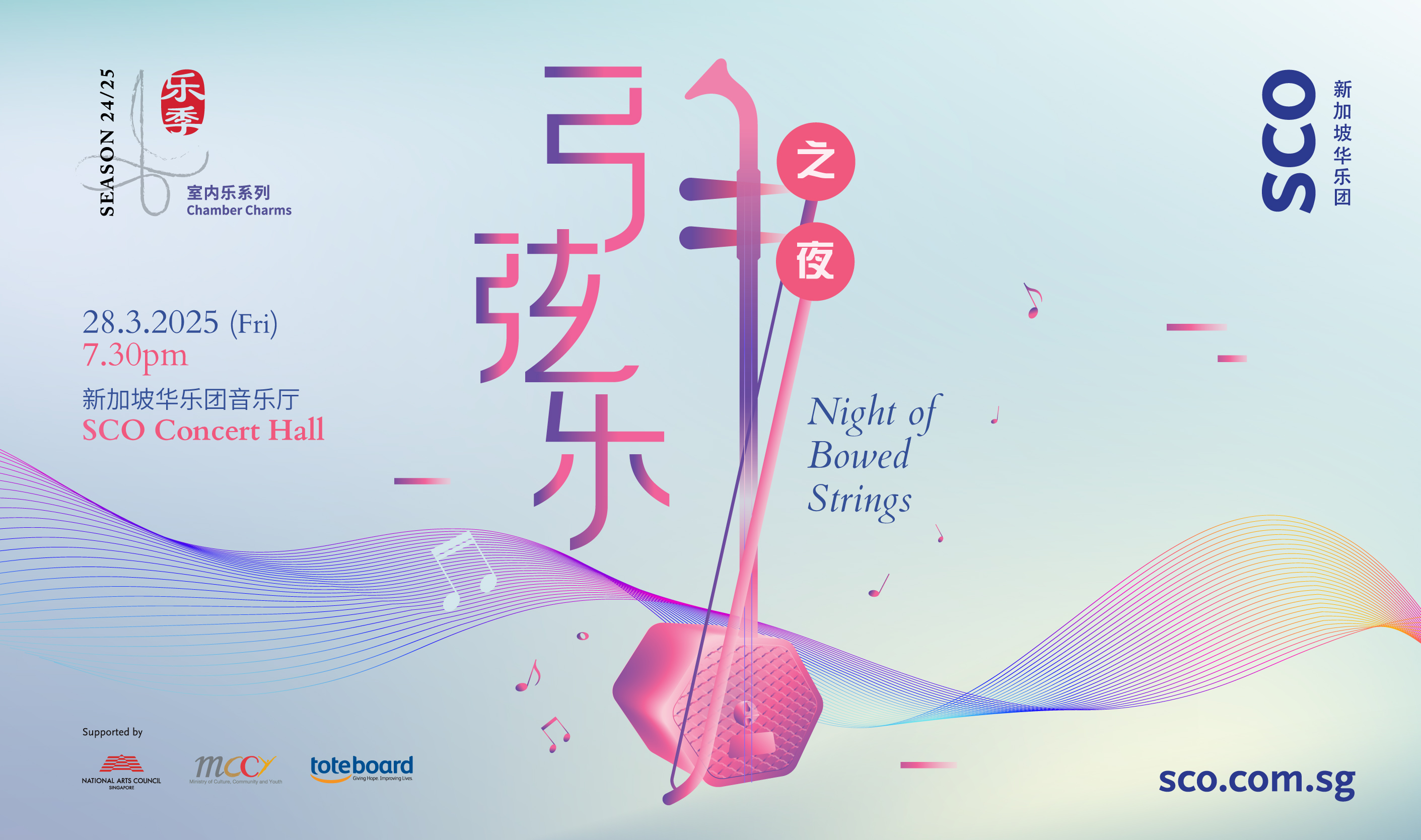Concert Season 24/25 | Virtuoso Series 乐季24/25 | 八音荟萃
By Jon Lin CHUA
Peking opera is one of the major opera forms in China, and also remains one of the most treasured cultural offerings of the Chinese people. Hailed by UNESCO as an intangible cultural heritage, this art form has also gained popularity and garnered traction within mainstream consciousness through its appearance in award-winning films, drama series, and popular music. In this concert, the rich heritage of Peking opera is celebrated through a wide range of repertoire, ranging from vocal selections and tunes adapted from renowned Peking operas, to opera-inspired television drama theme music.
The programme opens with Zhao Jiping’s The Moon at Dawn over Lugou Bridge, an orchestral work adapted from the theme music of the popular Chinese television drama series The Family Legend, and is thus familiar to many of the Chinese audience worldwide. Rich in traditional operatic elements, its colouristic harmonies and modulations also add a cinematic quality to the music, making it readily accessible to contemporary mainstream audiences who are familiar with media music.
Other familiar favourites on the programme which present traditional Peking opera melodies in their more original forms include Chinese orchestral classics The Surging of Turbulent Clouds arranged by Peng Xiuwen and Night Thoughts arranged by Li Minxiong and Wang Jianhua. The Surging of Turbulent Clouds was adapted from a vocal selection from the modern Peking opera Mount Azalea, and Night Thoughts was adapted from a traditional Peking opera standard melody, but both have become recognised as Chinese orchestral staples, and remain popular amongst Chinese orchestral audiences. Considered to be one of “Red Classics” (classics of the Maoist era), Mount Azalea is rather well-known, and the vocal selection The Surging of Turbulent Clouds is also one of the famous passages from this opera due to its range of expression. As a standard opera melody, Night Thoughts has been featured in numerous operas, including the famous sword dance by Yu Ji in the Peking opera Farewell My Concubine. Both are original opera melodies which have been arranged and orchestrated for the Chinese orchestra. Night Thoughts also feature veteran musicians Prof. Wang Caiyun on the jinghu, the lead fiddle in traditional Peking opera, as well as Prof. Wang Jianhua on the dagu (big drum).
Though the performance of Yang Nailin’s Ode to Pear Blossom on this programme is a Singapore premiere, the piece is nevertheless well-known. It is adapted from the theme song of Imperial Concubine of the Tang Dynasty, a modern Peking opera production. Though it was composed during modern times and premiered in 2003, the melody is written in accordance with traditional Peking opera modes and also incorporates the Mei style of singing (after the famous opera singer Mei Lanfang), which is known for its lyricism and emotive quality, presenting this aspect of traditional Peking opera in contrast to pieces like Night Thoughts which are more martial in character.
Besides these pieces incorporating traditional opera elements or adapting traditional opera melodies, the programme also includes three original vocal selections from the modern Peking opera and one of the eight Model Operas from the Cultural Revolution Taking Tiger Mountain by Strategy. Taking centre stage to present For Spring to Grace the Land Again, Leaving my Mark in History, and We are the Soldiers of the Workers and Peasants is young opera artiste Li Bo, along with Prof. Wang Caiyun on the jinghu and Prof. Wang Jianhua on opera percussion. The orchestra hopes to present these three vocal selections in this concert as close as possible to their original forms. These selections present a snapshot of the Zeitgeist of the Cultural Revolution, with their invigorating and energetic character.
Ending this concert of repertoire featuring traditional Peking operatic elements is Zhao Jiping’s orchestral piece Guo Feng, which departs from Peking opera and instead draws upon the melodic theme from ancient guqin piece Three Variants of the Plum Blossom. The programme opens and closes with the rich harmonies and lush orchestral colours which are quintessential to Zhao Jiping’s writing, but features elements from different genres of traditional Chinese music. The piece balances lyricism with bolder and more exhilarating passages highlighting the breadth of sound of the orchestra, ending the programme with a piece that showcases the orchestra as a whole once more.
Tradition, familiarity, and accessibility set the tone for tonight’s programme, while showcasing the artistry of the guest soloists, conductor, and the orchestra. Chinese orchestral aficionados may look forward to basking in the nostalgia of familiar favourites while also learning more about the wide range of expression and timeless beauty of traditional Peking opera on this concert.
蔡宗玲 /撰文
京剧是中国主要的戏曲种类之一,也是中国人民的文化瑰宝。京剧被联合国教科文组织誉为非物质文化遗产,通过在电影、电视剧及流行音乐中的出现,逐渐在通俗文化中获得较为广泛的认知与关注。本场音乐会中将通过多样的曲目展现京剧的丰富色彩,其中包含著名京剧唱段和曲牌的改编曲目,以及融入京剧元素的的电视连续剧主题音乐。
音乐会以赵季平的华乐作品《卢沟晓月》开场。此曲改编自中国热播电视剧《大宅门》的主题曲,知名度也相当高。作品富于传统戏曲元素,其和声色彩丰富,为音乐增添了影视般的质感,对于熟悉影视音乐的当代观众较具有亲和力。
音乐会上的其它经典曲目包括由彭修文改编的华弦乐名作《乱云飞》,以及由李民雄、王建华改编的《夜深沉》,以较为亲近原曲的形式呈现了一些传统京剧旋律。《乱云飞》改编自现代京剧《杜鹃山》中的一段唱段,而《夜深沉》则改编自京剧传统曲牌。这两部作品如今已成为经典的华乐曲目,并深受华乐乐迷喜爱。《杜鹃山》是“红色经典”之一,其中的唱段《乱云飞》以其丰富的情感表现力而广为流传。《夜深沉》作为京剧中的曲牌,曾出现在许多戏剧中,包括《霸王别姬》中虞姬的著名剑舞段落。两首乐曲的旋律原为传统京剧旋律,后经改编为华乐团的形式演奏。这场音乐会上的《夜深沉》也将由资深京胡演奏家王彩云教授以及打击乐演奏家王建华教授联袂演出。
尽管杨乃林的《梨花颂》这次是新加坡首演,但该曲在中国早已广泛流传。它改编自现代京剧《大唐贵妃》的主题曲,虽是在2003年首演的现代创作,但其旋律遵循传统京剧的二黄调式,并融入了梅兰芳“梅派”的唱腔风格,抒情优美,与像《夜深沉》这类更具阳刚色彩的曲子形成强烈对比,表现出了传统京剧的多样化。
除了这些融入传统京剧元素或改编自传统京剧唱段或曲牌的乐曲,这场音乐会还包括三首选自现代京剧及八大样板戏之一《智取威虎山》的唱段。年轻京剧演员李博将与京胡演奏家王彩云教授以及京剧打击乐演奏家王建华教授携手演绎《迎来春色换人间》、《甘洒热血写春秋》和《我们是工农子弟兵》这三首唱段,力求最大程度地以其原来风貌呈现。这些唱段展现了文革时期人民积极热烈的精神面貌。
这场音乐会的压轴曲为赵季平的管弦乐作品《国风》。它脱离了京剧风格,但音乐主题采自于古琴曲《梅花三弄》。音乐会以赵季平的作品开篇和收尾,两首的和声及乐队色彩极为丰富,也呈现了中国传统音乐不同的风格元素。该作品包含着抒情优美的段落,也包含着激昂慷慨的段落,充分展现了华乐团声响上的广度,为本场音乐会划上句点。
传统、熟悉与亲切形成这场音乐会的基调,同时也展现了客席演奏家、指挥家及新加坡华乐团的精湛技艺。华乐听众不仅可以沉浸在熟悉经典的怀旧氛围中,还能通过这场音乐会感受到传统京剧的丰富表现力以及其历久弥新之美。

